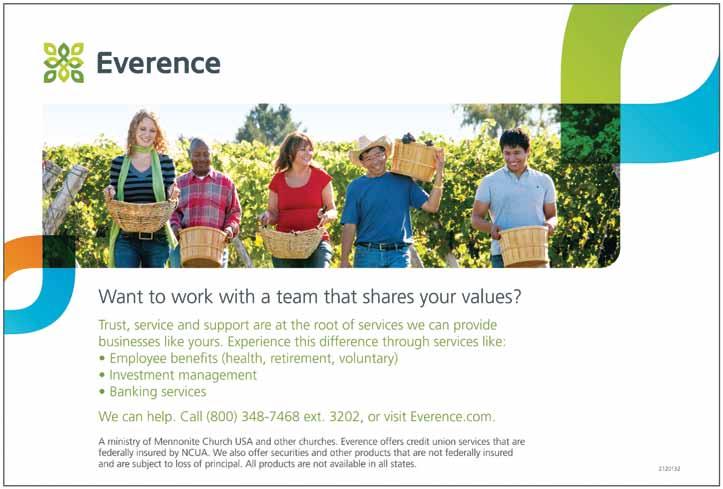
4 minute read
Soundbites
The church as a business
The church is a business, and a sizable one at that. Taken as a whole, churches and other places of worship continue to receive the largest share of Americans’ charitable giving, more than education, human services, health, and other categories.... Whether or not we are comfortable with acknowledging it, business management is an indispensable facet of ministry. Churches hire and pay staff, own and manage property, invest money, keep accounting records, file financial reports with government agencies, hire management and fund-raising consultants, comply with employment laws, own fleets of vehicles, purchase goods and services, and advertise their own services to the marketplace. Larger churches frequently hire business managers supervised by clergy. Some churches own broadcast facilities, recreational complexes, day schools, night shelters, and medical facilities. — John C. Knapp in How the Church Fails Businesspeople (and what can be done about it) to be from 30 percent of annual salary for an entry-level employee to 400 percent of annual salary for a high-level employee. — Joy Powers in Ragan Report
Having fun yet?
Trying to boost your company’s bottom line? Invest in employee morale. Happy workers are 12 percent more productive, according to a study from Warwick Business School. Conversely, unhappy employees hurt your business. Not only are they less productive and absent more, but you will pay the price for months or years if they walk out the door. Turnover costs are estimated ing in Business without Losing Your Faith
Ethics 101
Moral actions begin with “ethical intelligence,” says ethics consultant Bruce Weinstein in his book, Ethical Intelligence.
Developing the capacity to make the right choices hinges on five basic principles: 1. Do no harm. Don’t hurt people. If you have to make a tough call, like downsizing, do as little damage as possible. 2. Make things better. Aim to help others, such as by providing excellent customer service or by starting a business to address a social need. 3. Respect others. Honor other people’s values, preferences and rights. 4. Be fair. Give others their due when allocating scarce resources, disciplining and rectifying injustices. 5. Be loving. “Love is like the WD-40 of relationships. It’s not absolutely necessary, and you couldn’t be blamed for not using it — but it does make things flow better.”
Bottom line: Ask these questions: Will it avoid causing harm? Will it make things better? Is it respectful? Is it fair? Is it a loving thing to do?
These principles, says Weinstein, can ease any ethical dilemma, from the glaring lapses of Enron to deciding whether to stay home when you have the flu. (Globe & Mail)
How can I serve?
Ask yourself this question every day: “How may I best serve the most people?” Money is a function of value creation. The more value you create for other people, the higher the sales of your organization. — Leadership expert Robin Sharma in Up Magazine
Through a glass...
Few churches appreciate their business people as a window on the world, and fewer still provide business people with opportunities to discuss in depth the integration of business and Christian values. — Edward R. Dayton in Succeed-
Failing well
On average, successful people have had many more failures than unsuccessful people. This seems counterintuitive. How could successful people have failed more often than everyone else? Failure is unavoidable and sometimes happens randomly. It’s what you do after the failure that is important. Successful people have a stick-to-it-iveness. They don’t quit. From the president of FedEx to the novelist Jerzy Kosinsky, from Van Gogh to Bill Clinton to Fleetwood Mac, successful people have had many, many failures, but they learn from them and keep going. — Daniel J. Levin in This Is Your Brain On Music: The Science of a Human Obsession
Workplace justice
Seldom if ever are Christians addressed as influential actors responsible in their vocations

for seeing that, within their power, justice is done. They are not seriously challenged to ask questions about the human impact of their actions as workers, managers, consumers, and owners on their fellows. — Theologian and business ethicist Paul Cam‑ enisch

Bloody hands
Failing to communicate the truth of expectations and accountability to your associates puts “blood on your hands” when you terminate them and they don’t see it coming. If you catch employees by surprise when you fire them, you have failed as a leader. You either failed to set clear expectations, failed to give honest feedback on their performance, or failed to hold them accountable throughout their tenure with your organization.... No one working with you should ever have to guess where they, or you, stand concerning your expectations or their performance. Give fast, honest, specific feedback to reinforce productive actions and confront errant behaviors. — Dave Anderson in How to Lead by The Book
A tip for God?
For the proverbial tip must be at least a tithe, lest the waiter turn against you. Few people treat their God as well as they honor their waiter. For unto a waiter they give a tithe, but unto God they give whatsoever they think will get them by. Verily, does a person fear the waiter more than they fear God? — Quoted by Tom Cooper, City in Focus
Farm‑a‑care
If you care about the poorest, you care about agriculture. Investments in agriculture are the best weapons against hunger and poverty, and they have made life better for billions of people. — Philanthropist Bill Gates speaking to the Interna‑ tional Fund for Agricul‑ tural Development





